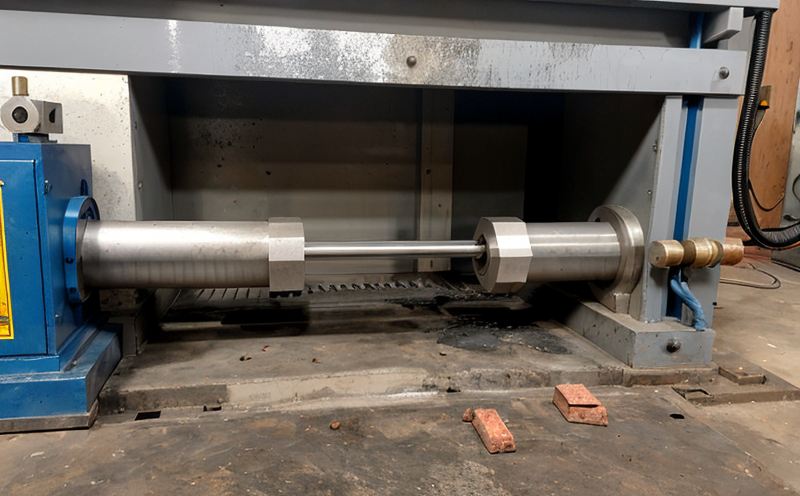ASTM D695 Compressive Testing of Plastics
The ASTM D695 standard provides a robust framework to determine the compressive properties of plastics. This testing is essential for ensuring that plastic materials meet specific mechanical property requirements, which are crucial in various industries such as automotive, aerospace, and consumer goods.
ASTM D695 defines the procedure for determining the compressive strength and modulus of elasticity for plastics at room temperature (23°C ± 2°C). The test involves subjecting a cylindrical specimen to uniaxial compression until failure. This process helps in identifying how much force can be applied before a material fails, which is vital for design purposes.
The compressive strength and modulus of elasticity are critical parameters because they reflect the material's resistance to deformation under stress. For instance, in the automotive industry, these properties help engineers select materials that will withstand high loads without permanent deformation or fracture. In consumer goods manufacturing, understanding these characteristics ensures product durability and safety.
The testing procedure is straightforward but precise. Specimens are typically cylindrical in shape with a diameter equal to their height. The test setup includes a compression testing machine capable of applying controlled force at a constant rate until the specimen fails. The load and displacement data collected during this process are used to calculate compressive stress and strain.
Material selection is critical for achieving accurate results. Factors such as sample geometry, surface finish, and conditioning play significant roles in ensuring consistent test outcomes. It's also important to note that the testing machine must be calibrated regularly to ensure accurate measurements. Calibration ensures that the equipment can accurately apply specified loads and measure displacements.
ASTM D695 is widely recognized for its reliability and repeatability, making it a preferred standard in quality assurance processes. It helps industries maintain consistent product performance by providing a standardized method of testing. By adhering to this protocol, manufacturers can ensure that their products meet the necessary mechanical property requirements set by regulatory bodies.
Understanding the implications of ASTM D695 is essential for professionals involved in material selection and quality assurance. This knowledge enables them to make informed decisions about which materials are suitable for specific applications. It also supports compliance with international standards, thereby enhancing product safety and reliability.
In conclusion, ASTM D695 compressive testing serves as a cornerstone of mechanical property evaluation for plastics. By providing a clear methodology for determining key parameters like compressive strength and modulus of elasticity, this standard ensures that plastic materials meet the necessary performance criteria across various industries. The expertise required to conduct such tests accurately is indispensable in maintaining high-quality standards.
Frequently Asked Questions
Benefits
- Promotes consistency in material testing across different facilities
- Aids in selecting appropriate plastic materials for specific applications
- Ensures compliance with international standards, enhancing product safety and reliability
- Supports the development of high-quality products that meet industry demands
- Facilitates accurate measurement and reporting of mechanical properties
- Reduces the likelihood of material failures in critical applications
Quality and Reliability Assurance
ASTM D695 is integral to quality assurance processes by providing a standardized method for testing compressive strength and modulus. This ensures that plastic materials consistently meet the required mechanical property standards, enhancing product reliability. By adhering to this protocol, manufacturers can ensure compliance with international regulations, thereby maintaining high-quality standards.
The test results from ASTM D695 help identify any inconsistencies or defects in the production process. This information is vital for continuous improvement initiatives aimed at enhancing overall quality control measures. Through regular testing and analysis, companies can pinpoint areas requiring attention to prevent potential issues before they become significant problems.
Moreover, the standard supports robust supplier evaluation processes by providing a consistent basis for assessing material performance. This helps in selecting reliable suppliers who consistently deliver high-quality materials, further contributing to overall product quality. By implementing ASTM D695, organizations can build trust with their customers and stakeholders while maintaining competitive advantage through superior product offerings.
Environmental and Sustainability Contributions
The application of ASTM D695 in material testing plays a crucial role in promoting sustainability practices. By ensuring that plastics meet stringent mechanical property requirements, this standard supports the development of durable and reliable products. This contributes to reducing waste by enhancing product longevity and encouraging the use of sustainable materials.
Compliance with ASTM D695 helps industries adhere to environmental regulations aimed at minimizing impacts on ecosystems. For example, in the automotive sector, ensuring that components made from plastics comply with these standards can lead to reduced fuel consumption due to lighter vehicles, ultimately contributing to lower greenhouse gas emissions.
Furthermore, by promoting the use of high-quality materials through rigorous testing procedures like ASTM D695, industries are encouraged to adopt more sustainable practices throughout their supply chains. This includes sourcing raw materials responsibly and designing products that are easier to recycle or repurpose at end-of-life stages.





